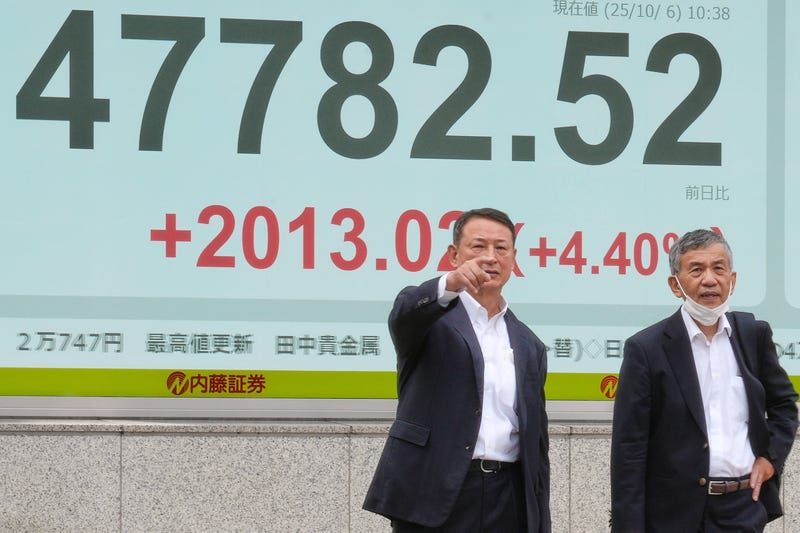
Japan’s Nikkei stock index jumped nearly 5% on Monday to a new record close while shares in France fell back after its prime minister resigned less than a month after taking office.
The CAC 40 in Paris dropped 1.8% to 7,937.43 in early trading.
France's new prime minister, Sébastien Lecornu, resigned just a day after he named his government, drawing a backlash across the political spectrum for his choice of ministers. French politics have been in disarray since President Emmanuel Macron called snap elections last year that produced a deeply fragmented legislature.
In Germany, the DAX was little changed at 24,388.31 and Britain's FTSE 100 fell 0.2% to 9,473.51.
The future for the S&P 500 gained 0.3%. On Friday, it hit yet another record high close, as did the Dow Jones Industrial Average. Its future contract was up 0.1% early Monday.
While Tokyo's Nikkei 225 soared, gaining 4.8% to 47,944.76, the Japanese yen weakened after the ruling Liberal Democratic Party chose ultra-conservative lawmaker Sanae Takaichi as its leader and likely Japan's first woman prime minister.
In intraday trading the Nikkei climbed as high as 48,150.04.
Takaichi, 64, was an ally of the late Prime Minister Shinzo Abe and is expected to carry on with his market-friendly policies since she backed his traditionalist vision for the country. She is almost certain to become prime minister because the LDP has the most seats in the lower house, although not a majority. It chooses the prime minister, and opposition groups are splintered.
The yen slipped against the U.S. dollar on expectations that Takaichi will boost spending, likely adding to inflationary pressures. The dollar rose to 150.31 Japanese yen from 149.33 yen. The euro slipped to $1.1674 from $1.1730.
Investors, especially non-Japanese ones, were pleased, said Neil Newman, head of strategy at Astris Advisory Japan.
“Obviously, investors like what she has been saying and certainly today judging by the number of stocks that moved and which stocks moved, it seems like pretty much led by foreigners so far," Newman said.
Defense-related shares got a big boost, given Takaichi's hawkish stance. Stock in Kawasaki Heavy Industries leaped 9.2% and Mitsubishi Heavy Industries soared 11.1%.
An unconfirmed report that U.S. President Donald Trump might be considering ways to reduce the cost of his higher tariffs on auto parts and other materials for U.S. manufacturers helped automakers' share prices. Toyota Motor Corp.'s shares jumped 4.9% in Tokyo and Honda Motor Co. gained 4.1%.
Elsewhere in Asia, Hong Kong's Hang Seng index sank 0.7% to 26,957.77. Markets in mainland China were closed for a holiday. They reopen on Thursday.
Markets were also closed in Taiwan and South Korea, among other places.
In Australia, the S&P/ASX 200 shed 0.1% to 8,981.40.
Markets in mainland China, Taiwan and South Korea were closed for holidays.
On Friday, most U.S. stocks ticked higher, adding to Wall Street records.
The S&P 500 edged up by less than 0.1% and the Dow Jones Industrial Average climbed 0.5%. The Nasdaq composite slipped 0.3%.
The shutdown of the U.S. government, which began Oct. 1, delayed the release of the monthly jobs update showing how many jobs employers created and destroyed.
Such information is particularly important given how anxious investors are to see the job market continuing to slow by enough for the Federal Reserve to keep cutting interest rates.
Past shutdowns of the U.S. government have tended not to hurt the economy or stock market much, and the thinking is that this one could be similar, even if President Donald Trump has threatened large-scale firings of federal workers this time around.
Reports came in mixed on activity for U.S. businesses in the health care, real estate and other services industries. One from the Institute for Supply Management said growth is stalling, while another from S&P Global said it’s still growing slowly.
In other dealings early Monday, U.S. benchmark crude oil gained 99 cents to $61.87 per barrel. Brent crude, the international standard, added $1.03 to $65.56 per barrel.
A group of countries that are part of the OPEC+ alliance of oil-exporting countries agreed during the weekend to a small boost in oil production, citing a steady global economic outlook. That alleviated fears of an oversupply.